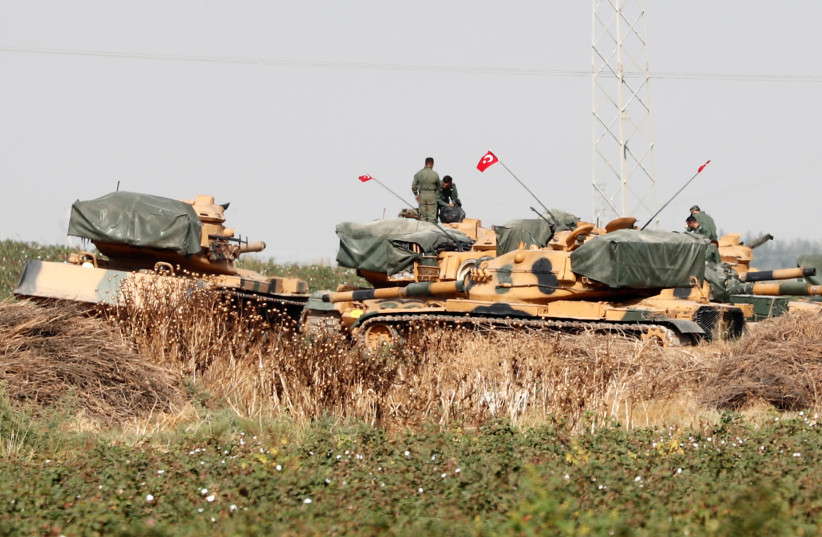Iran may be upping tensions with Turkey. The evidence can so far be found in one article at Fars News which accuses Turkey and its leading AKP party of backing “terrorists.” This comes as the world is changing and countries weigh their next moves amid the Ukraine war. Turkey is seeking to play both sides, being friendly with Russia and also Ukraine. Meanwhile, Russia is holding up the Iran deal.
Turkey is also critiquing Iran. “Tehran is trying to take advantage of the Ukraine crisis and strengthen its own position in the Syrian arena. Soon after Russia attacked Ukraine in late February, Iran and the Syrian regime increased their strategic engagement by increasing military diplomacy,” an article at Turkish state media TRT said.
Fars News says that Turkey’s foreign policy has fluctuated in recent years. It has moved from having “zero problems” with is neighbors to seeking to recreate a kind of new Ottoman empire.
“Although Turkey sought to reduce tensions with its neighbors to zero during Ahmed Davutoglu’s chairing of the Foreign Ministry [this lasted] until the wave of Islamic awakening. Erdogan has since abandoned the strategy in pursuit of widespread influence. He dealt with regional developments even with unreasonable means.”
This is tough language for an Iranian paper close to the IRGC. Turkey has expanded its presence in Africa, the article says; and it has expanded its “presence in northern Iraq to suppress Kurdish separatist groups.” Meanwhile Fars says that Turkey has “also suffered devastating defeats in this regard. The inability to overthrow the Syrian government has created major internal divisions as well as the dangers of the spread of terrorism are some of these failures.”

The report says that the “Erdogan government saw the spread of this widespread wave of unrest and terrorism in Syria as a way to expand its influence in the country.
The situation became more sensitive for Turkey when a significant part of the armed movements was led by the branch of the Muslim Brotherhood in Syria.”
The ruling AKP party in Turkey is rooted in the Brotherhood. “From the very beginning, Turkey tried to secure its role in Syria by supporting these armed groups after the possible overthrow of the Assad government.”
The article claims Turkey worked with NATO and other Arab countries to “arm terrorist groups in Syria.” Iran’s media goes as far as to single out Turkish official Hakan Fidan as carrying “the main burden of financing this dangerous process.”
The report also says “former Qatari prime minister Hamad bin Jassim, [Doha] bore the brunt of supporting Turkish policy in Syria.”
In addition, “a special operations room was set up in Turkey in cooperation with the United States and other NATO member states, and thousands of terrorists from various countries traveled to Turkish airports to go to Syria.”
The article then goes on to say that Turkey had direct contact with extremist groups and that westerners who joined ISIS went via Turkey. “Turkey even indirectly bought stolen oil produced by ISIS from oil fields in eastern Syria.
The footage, recorded by Russian drones and revealed by Russian Foreign Minister Sergei Lavrov at the UN Security Council, showed a long line of ISIL oil tankers heading to Turkey to unload their cargo.” Most of these accusations are well known and are based on old stories. Why is Iran bringing them up now? What is it doing?
The report says that after 2015 the “Turkish army entered the campaign directly to support terrorist groups in northern Turkey.” 2015 was the year Russia also intervened in Syria and the year of the Iran deal.
“Despite Turkey’s full support for these groups, a significant portion of these groups are now confined to Idlib province in Syria. The presence of the Turkish army in these areas and open interaction with these groups is no longer a secret. Terrorists such as the Hizb Tahrir al-Sham, Hiyat al-Tahrir al-Watani, and Faylaq al-Sham have continued to rule the region [in Syria] with the help of Turkey.”
Fars News goes on to say, “in addition, the Turkish government sees terrorists in northern Syria as a means of curbing sedition.”
Now the article notes that Syria’s President Bashar al-Assad went to the UAE recently. This is “shocking news for many parties in the Syrian affair.” Indeed, the US was not pleased with the visit.
“The story becomes interesting when we know that Erdogan has been trying to revive his relations with Arab countries, including the UAE, for some time due to the severe financial crisis in Turkey.” Turkey has also recently hosted Israel’s president.
Iran thinks Turkey was surprised to see the UAE host Assad. “Turkey embarked on a dangerous gamble with terrorist groups to gain control of the Ottoman Empire, but all its possible gains are fading; Especially since the Syrian government has gained good confidence in liberating Idlib province [which] as the last base of terrorists.” Now Iran predicts Turkey has harmed itself by backing “terrorist groups.”
The report says “perhaps it is time for Recep Tayyip Erdogan to pursue his foreign policy with serious reforms, to cut ties with terrorist groups, and to refrain from aimless projections and useless accusation.” This is very opinionated for Iranian media close to the regime in Tehran.
Meanwhile, TRT says that Iran may be increasing its position in Iraq and Syria. “Throughout the past month, researchers have witnessed how Tehran has expanded its efforts to move weapons, reconnaissance systems, missile defense systems, and drones from Iraqi territory into Syria and Lebanon. It is hypothesised that an indirect cause for this is the weakening of Russian-Israeli coordination. Otherwise, how else could one explain the fact that the Shi’ite formations, which the Syrian regime relies on, have become more active in the southern provinces of the republic—Deraa and As-Suwayda. The evidence of that is the situation with drug trafficking into Jordan.”
Clearly Tehran and Ankara are eying each other with new suspicion.
